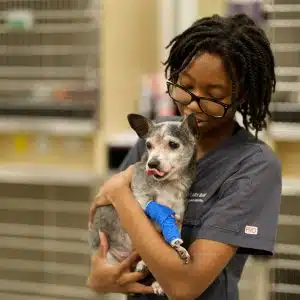Benefits of using Veterinary Oncology Services for your pet
Wiki Article
Comprehensive Guide to the Providers Used by a Vet Oncologist
Vet oncology encompasses a vast array of services focused on detecting and treating cancer cells in pet dogs. Pet Cancer Surgery. Oncologists utilize innovative diagnostic techniques and provide various treatment alternatives customized per pet's needs. They likewise focus on helpful care and supply valuable sources for family pet owners. Comprehending these services is essential for making informed choices. What certain facets of veterinary oncology can especially influence an animal's treatment journey?Understanding Veterinary Oncology
Vet oncology is a specialized area concentrated on identifying and dealing with cancer in pets. This technique incorporates a wide variety of approaches, from clinical treatments such as radiation treatment and immunotherapy to medical treatments targeted at eliminating tumors. Vet oncologists are educated to recognize the special symptoms of cancer in different species, enabling them to customize therapy plans to individual patients.Along with typical treatments, veterinary oncology emphasizes supportive treatment, which plays a vital function in improving the lifestyle for damaged pets. This consists of discomfort management, nutritional assistance, and palliative care choices. Partnership with pet owners is crucial, as they are integral to decision-making concerning their animals' therapy courses. As research breakthroughs, vet oncology remains to progress, providing new hope and enhanced outcomes for animals diagnosed with cancer cells. Generally, this field is essential for addressing the complexities of cancer in buddy pets.
Advanced Diagnostic Techniques
Advanced analysis techniques play a vital duty in vet oncology, giving essential insights into the presence and level of cancer cells in pets. Imaging modalities such as ultrasound, CT scans, and MRI are frequently used to visualize growths and assess their characteristics. Furthermore, biopsy procedures are crucial for getting tissue samples, enabling definitive diagnosis and tailored therapy strategies.Imaging Modalities Utilized
Imaging methods play a crucial role in the medical diagnosis and monitoring of cancer in pets. Vet oncologists use numerous advanced imaging strategies to evaluate lump metastasis, dimension, and presence. Radiography, or X-rays, provides an initial view of bone and breast problems, while ultrasound provides real-time imaging of soft tissues, enabling detailed examination of inner organs. Computed tomography (CT) improves visualization of intricate anatomical structures and enables 3D restorations, helping in precise tumor localization. Magnetic resonance imaging (MRI) is invaluable for soft tissue distinction, specifically in mind lumps. Furthermore, nuclear medication methods such as positron discharge tomography (ANIMAL) help identify metabolic task within lumps. Collectively, these techniques boost analysis accuracy, leading reliable therapy methods for oncological clients.Biopsy Procedures Clarified
Adhering to the initial assessment with imaging techniques, obtaining a definitive diagnosis often requires cells tasting via biopsy treatments. Veterinary oncologists make use of different biopsy strategies based upon the growth's location and characteristics. Fine needle goal (FNA) is a minimally intrusive technique that extracts cells for cytological exam, suitable for shallow masses. Core needle biopsies provide bigger tissue samples and work for much deeper lumps, enabling for histopathological evaluation. Surgical biopsies include excising a part or the entire tumor, promoting comprehensive assessment. These treatments not just validate the visibility of cancer however also aid establish its type and quality, guiding treatment choices. Each biopsy strategy is picked carefully to stabilize analysis accuracy with patient security and convenience.Therapy Choices for Cancer Cells in Family pets
When an animal is identified with cancer, a range of treatment alternatives become offered to aid enhance and handle the disease top quality of life. Veterinary oncologists generally recommend a multidisciplinary method customized to the specific pet dog's demands, which may include surgical treatment, radiation treatment, immunotherapy, or alternative treatments.Surgery is frequently used to get rid of lumps and damaged tissues, possibly bring about full remission in some situations. Radiation therapy intends to destroy and target cancer cells, lowering tumor dimension and minimizing signs and symptoms - Veterinary Cancer Specialist. Immunotherapy takes advantage of the family pet's immune system to eliminate cancer much more successfully, while alternative treatments could include acupuncture or natural supplements to support overall wellness
Each therapy alternative lugs its very own advantages and dangers, and veterinary oncologists function very closely with family pet proprietors to make a thorough plan that aligns with the family pet's specific medical diagnosis and the proprietor's dreams. The utmost goal is to boost the pet's comfort and lifestyle throughout their cancer cells journey.
Chemotherapy for Pets
Chemotherapy is an usual therapy option for animals diagnosed with cancer and is commonly utilized along with various other treatments detailed by veterinary oncologists. This therapy involves the administration of specific medicines developed to ruin and target cancer cells, thus decreasing lump dimension and avoiding the spread of the disease. Veterinary oncologists customize chemotherapy methods based on the kind of cancer cells, the pet dog's overall health and wellness, and the preferred treatment result.Negative effects can happen, as these medicines may additionally impact healthy and balanced cells. Typical reactions include queasiness, throwing up, and short-lived adjustments in appetite - Pet Cancer Surgery. Veterinary oncologists are furnished to handle these adverse effects successfully, making certain the family pet's convenience throughout the treatment process. Routine monitoring through blood tests and follow-up consultations is important to assess the animal's response to chemotherapy and make needed changes. Ultimately, chemotherapy can provide considerable advantages, enhancing the Veterinary Oncology Services lifestyle for animals encountering cancer cells medical diagnoses

Radiation Therapy in Vet Medicine
Radiation treatment functions as a reliable therapy choice for pet dogs diagnosed with local growths, using a targeted approach to cancer cells management. This strategy uses high-energy radiation to damage the DNA of cancer cells, preventing their ability to multiply. It is specifically advantageous for lumps that are not amenable to surgical removal or for situations where surgical treatment may not be possible due to the tumor's location.Veterinary oncologists tailor radiation methods based on tumor dimension, type, and area, along with the family pet's overall health. Treatment can be provided by means of exterior beam radiation or brachytherapy, each with distinctive advantages. Usually, multiple sessions are needed to make the most of performance while minimizing adverse effects.
Although family pets may experience momentary responses such as skin irritation, the total objective is to reduce lumps and alleviate signs, ultimately improving the pet's prognosis and top quality of life. As necessary, radiation treatment plays a necessary role in comprehensive cancer cells care.
Palliative Care and Quality of Life
Palliative care in vet oncology concentrates on boosting the top quality of life for pet dogs encountering terminal ailments, ensuring comfort and self-respect in their final days. This specific technique focuses on discomfort administration, symptom control, and emotional assistance. Vet oncologists examine each family pet's specific requirements, customizing treatments to minimize discomfort and boost overall wellness.Methods might include providing medications for pain alleviation, handling nausea or vomiting, and resolving various other distressing symptoms. In addition, dietary support is often offered to preserve toughness and enhance hunger. The emotional aspect of palliative treatment is just as important; creating a tranquil environment helps lower anxiousness for both animal and proprietor.
Ultimately, the objective of palliative treatment is to permit animals to appreciate their staying time with as much pleasure and self-respect as possible. By focusing on convenience and lifestyle, veterinary oncologists play a vital role in making certain that family pets and their family members browse this difficult journey with concern and understanding.
Support for Pet Owners Throughout Treatment

Psychological Guidance for Owners
Charting the emotional landscape during a pet's cancer cells treatment can be an overwhelming experience for proprietors. The uncertainty surrounding diagnosis and diagnosis can result in sensations of helplessness, stress and anxiety, and despair. Vet oncologists identify the importance of psychological assistance and commonly provide guidance to help owners navigate this hard journey. Communication is crucial; reviewing treatment alternatives and potential outcomes can ease some anxieties. In addition, providing reassurance that emotional responses are legitimate fosters an encouraging environment. Many oncology facilities might additionally recommend support system or counseling solutions tailored for family pet proprietors, promoting shared experiences. Encouraging owners to focus on self-care during this time around is vital, as their psychological wellness directly influences their pet's convenience and general treatment experience.
Resources and Educational Materials
Steering with the complexities of a pet's cancer treatment can be frightening for owners, making access to instructional materials and reliable resources crucial. Veterinary oncologists usually provide a selection of handouts, brochures, and online products that explain therapy choices, possible side impacts, and care methods. These sources aid debunk the process and encourage family pet owners to make informed decisions. Additionally, numerous oncology centers supply access to support discussion forums and teams where owners can connect with others dealing with comparable obstacles, promoting a sense of neighborhood. Educational webinars and seminars conducted by vet experts better improve understanding, ensuring that owners are well-appointed to browse their family pet's trip via cancer treatment with confidence and understanding.Regularly Asked Questions
How Can I Prepare My Animal for a Veterinary Oncology Browse Through?
Preparing a pet dog for a vet oncology check out includes celebration clinical records, noting signs and symptoms, and guaranteeing the pet dog fits. A tranquil temperament and acquainted products can help reduce anxiety throughout the appointment.What Are the Indications My Pet Dog May Have Cancer Cells?
Indicators that a pet dog might have cancer cells include unexplained weight management, relentless vomiting or looseness of the bowels, uncommon lumps or swellings, sleepiness, modifications in cravings, difficulty breathing, and alterations in behavior. Trigger veterinary focus is necessary.How Can I Assistance My Family Pet Psychologically Throughout Treatment?
Sustaining a pet psychologically throughout therapy entails supplying convenience, preserving routines, supplying gentle affection, and guaranteeing a tranquil environment. Engaging in silent play and routine friendship assists minimize anxiety and promotes a complacency.Exist Alternate Treatments for Pet Dogs With Cancer cells?
Alternative therapies for animals with cancer consist of acupuncture, natural treatments, and dietary support. These strategies may enhance standard treatments, advertising total well-being. Consulting with a veterinarian is important for effective and safe combination of different treatments.What Costs Should I Anticipate for Veterinary Oncology Services?
The anticipated costs for veterinary oncology solutions can differ significantly, often affected by diagnostics, therapies, and continuous treatment. Pet owners should prepare for expenses ranging from appointments to specialized therapies, mirroring the intricacy of cancer cells administration.Partnership with animal owners is essential, as they are important to decision-making concerning their pets' treatment courses. Each treatment alternative lugs its own benefits and dangers, and vet oncologists work carefully with pet owners to create a thorough strategy that aligns with the pet's particular diagnosis and the owner's dreams. Pet dogs may experience short-lived reactions such as skin irritability, the total aim is to diminish growths and alleviate signs and symptoms, ultimately boosting the animal's diagnosis and high quality of life. Support for animal owners during therapy is important in steering via the psychological challenges connected with a pet's cancer medical diagnosis. Preparing a pet for a vet oncology see entails event medical documents, keeping in mind signs, and guaranteeing the pet dog is comfortable.
Report this wiki page